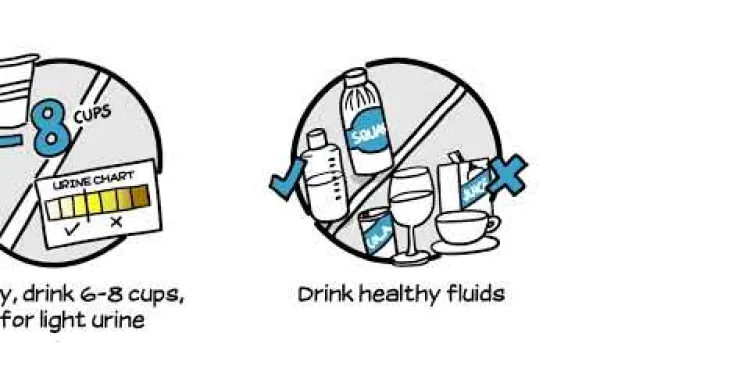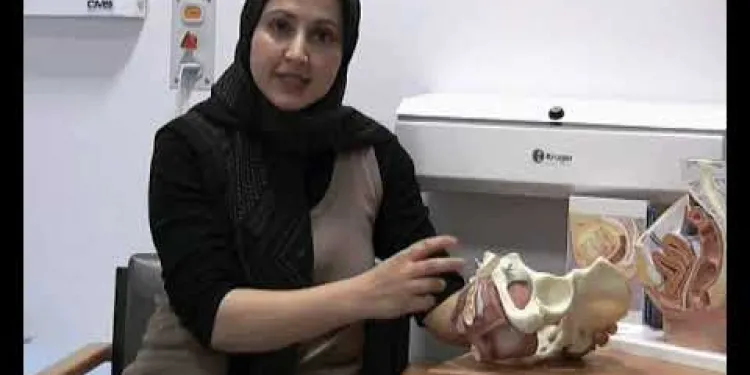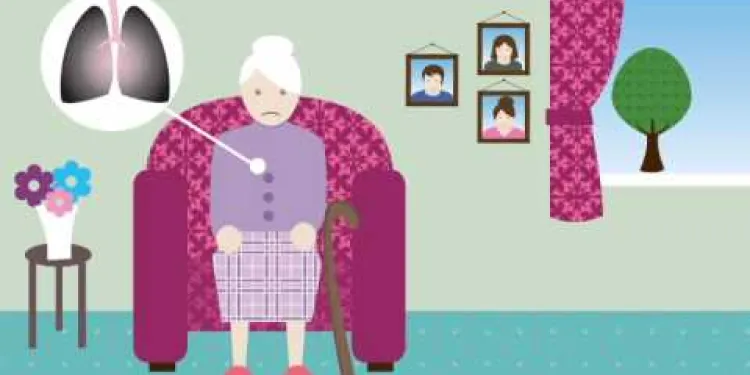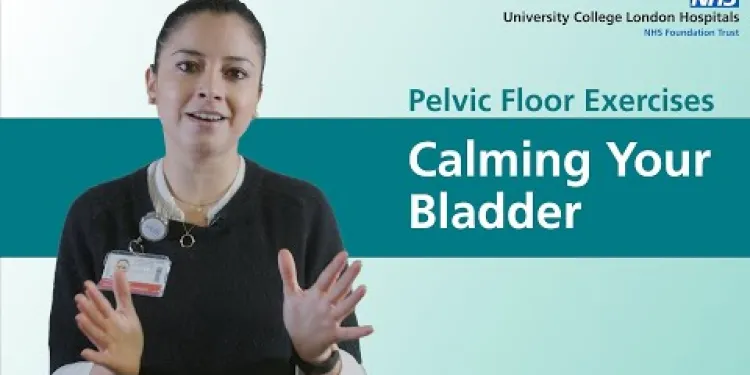Find Help
More Items From Ergsy search
-

Avoiding infections with urinary incontinence
Relevance: 100%
-

Physiotherapy Assessment of Urinary Incontinence
Relevance: 79%
-

Pelvic health: stress urinary incontinence
Relevance: 72%
-

Newcastle Specialist Continence Service's Light Urinary Incontinence Project
Relevance: 67%
-

Incontinence | NHS
Relevance: 61%
-

Pelvic health: Urge Incontinence
Relevance: 51%
-

Incontinence and Prolapse - Physiotherapy Advice
Relevance: 42%
-

Incontinence and Prolapse - Physiotherapy Advice
Relevance: 40%
-

Sandwell and West Birmingham Hospitals NHS Trust – Faecal Incontinence and Constipation Healthcare
Relevance: 32%
-

Your pelvic health matters: insights from NHS clinicians
Relevance: 29%
-

Can a stoma bag cause infections?
Relevance: 28%
-

What are the side effects of prostate cancer surgery?
Relevance: 27%
-

Are there any complications associated with untreated BPH?
Relevance: 26%
-

How is E. coli infection diagnosed?
Relevance: 24%
-

Mycobacterium chimaera infection
Relevance: 24%
-

Are E. coli infections contagious?
Relevance: 24%
-

What are the symptoms of BPH?
Relevance: 24%
-

Are there symptoms of an HPV infection?
Relevance: 23%
-

How soon do symptoms appear after infection?
Relevance: 23%
-

Do antibiotics work on viral infections?
Relevance: 23%
-

Chest infection: what should I do?
Relevance: 23%
-

Can E. coli infections be treated?
Relevance: 23%
-

How does surgery treat prostate cancer?
Relevance: 23%
-

What is Chikungunya virus infection?
Relevance: 22%
-

Antibiotics and You: An introduction to antibiotic resistant infections
Relevance: 22%
-

Can animals be infected with H3N2?
Relevance: 22%
-

Self care: Treating ear infections
Relevance: 22%
-

Can ear infections lead to tinnitus?
Relevance: 22%
-

Podiatrist Fungal feet - fungal infection of skin and nails and how to prevent fungal infection in feet
Relevance: 22%
-

What are the symptoms of Nipah Virus infection?
Relevance: 21%
-

How do people get infected with E. coli?
Relevance: 21%
-

Dorothy's Story (Falls/Chest Infection)
Relevance: 21%
-

How can E. coli infections be prevented?
Relevance: 21%
-

Sexually transmitted infections STIs
Relevance: 21%
-

Who is at risk for severe Chikungunya infection?
Relevance: 21%
-

How is Chikungunya virus infection diagnosed?
Relevance: 21%
-

Can Chikungunya virus infection be treated?
Relevance: 21%
-

What populations are at higher risk for E. coli infections?
Relevance: 21%
-

What role do infections play in chronic fatigue syndrome?
Relevance: 20%
-

Pelvic Floor Exercises - Using Your Pelvic Floor to Calm Down Your Bladder
Relevance: 20%
Avoiding Infections with Urinary Incontinence
Understanding Urinary Incontinence
Urinary incontinence is a common condition that affects millions of people in the United Kingdom. It involves the involuntary leakage of urine and can significantly impact the quality of life. Among the various challenges associated with urinary incontinence, one of the most concerning is the increased risk of urinary tract infections (UTIs). However, by adopting certain practices, individuals can reduce the likelihood of infections and maintain better urinary health.
Maintaining Good Hygiene
Good personal hygiene is crucial in preventing infections related to urinary incontinence. It's essential to keep the genital area clean and dry. Regularly use mild, unscented soaps and warm water to clean the area, making sure to wipe from front to back to avoid transferring bacteria from the anal region to the urinary tract. For those using incontinence products like pads or adult nappies, changing them frequently is necessary to prevent bacteria growth.
Staying Hydrated
While it might seem counterintuitive, drinking plenty of water is important. Adequate hydration helps to flush out bacteria from the bladder and urinary tract. It’s generally advised to avoid beverages that can irritate the bladder, such as caffeine and alcohol. Aim to drink six to eight glasses of water a day, but this can vary depending on individual health circumstances.
Use of Incontinence Products
Different products can aid in managing urinary incontinence, but their proper use is critical to prevent infections. Choose breathable, high-absorbency products. Some products offer added antibacterial protection. Avoid tight-fitting clothes as they can increase moisture and warmth, creating a breeding ground for bacteria. Look for products specifically designed for incontinence that help to keep the skin dry and healthy.
Regular Medical Consultation
Regularly consulting a healthcare provider is vital for anyone managing urinary incontinence. They can offer specialized advice tailored to your individual situation and health needs. In the UK, the NHS provides resources and support for those dealing with incontinence issues. Regular check-ups ensure that any signs of infection are caught early and treated promptly.
Conclusion
While urinary incontinence can increase the risk of infections, adopting good hygiene practices, staying hydrated, using the right incontinence products, and having regular medical consultations can significantly mitigate this risk. By following these guidelines, individuals can lead healthier, more comfortable lives free from the burden of frequent infections.
Avoiding Infections with Urinary Incontinence
Understanding Urinary Incontinence
Urinary incontinence means you might leak urine without wanting to. Lots of people in the United Kingdom have this problem. It can make life harder and can cause you to get more bladder infections, called urinary tract infections (UTIs). But you can do things to help stop infections and keep your bladder healthy.
Maintaining Good Hygiene
Keeping your body clean helps stop infections, especially if you leak urine. Wash the area around your private parts with warm water and a soft soap that doesn’t smell. Always wipe from the front to the back after using the toilet. If you use pads or adult nappies, change them often to keep bacteria (germs) away.
Staying Hydrated
Drinking lots of water is important. It helps remove germs from your bladder. Try to drink six to eight glasses of water every day. Stay away from drinks like soda, coffee, or alcohol. These drinks can upset your bladder.
Use of Incontinence Products
There are things you can wear to help with leaks. Pick ones that are breathable and soak up well. Some even help fight germs. Don't wear tight clothes because they can keep your private parts wet and warm, which germs like. Choose clothes and products that let your skin stay dry and healthy.
Regular Medical Consultation
See a doctor often if you have urinary incontinence. Doctors can give advice just for you. They can help find problems early, so you get better faster. In the UK, the NHS offers help for people with this condition.
Conclusion
Even though urinary incontinence can lead to infections, you can take steps to lower this risk. Keep clean, drink water, use the right products, and visit your doctor regularly. Doing these things will help you live a healthier, more comfortable life without many infections.
Frequently Asked Questions
What is urinary incontinence?
Urinary incontinence is the involuntary leakage of urine, meaning a person urinates when they do not want to. Incontinence is a common condition that can affect anyone but is more common in older adults.
What are the types of urinary incontinence?
The main types of urinary incontinence are stress incontinence, urge incontinence, mixed incontinence, overflow incontinence, and functional incontinence.
How can urinary incontinence lead to infections?
Urinary incontinence can increase the risk of urinary tract infections (UTIs) because the constant presence of urine can create a moist environment conducive to bacterial growth.
What are the symptoms of a urinary tract infection (UTI)?
Common symptoms of a UTI include a frequent urge to urinate, a burning sensation during urination, cloudy or strong-smelling urine, pelvis pain, and occasionally fever.
How can I prevent UTIs if I have urinary incontinence?
To prevent UTIs, maintain good hygiene, stay hydrated, regularly change incontinence pads or products, and promptly treat any signs of infection. Avoid bladder irritants like caffeine and alcohol.
Should I change my incontinence product frequently?
Yes, changing incontinence products frequently helps to keep the skin dry and reduce the risk of bacterial growth and skin irritation, which can lead to infections.
What hygiene practices should I follow to avoid infections?
Clean the genital area daily with mild soap and water. Avoid using harsh soaps or douches, and always wipe from front to back to prevent the spread of bacteria.
Can staying hydrated help with urinary incontinence?
Yes, staying hydrated ensures that the bladder is regularly flushed, which helps in preventing infections. However, avoid drinks containing caffeine and alcohol as they can irritate the bladder.
Is it important to consult a healthcare provider about urinary incontinence?
Yes, consulting a healthcare provider is important. They can help identify the cause of incontinence and recommend appropriate treatments and preventive measures for infections.
Can certain foods or drinks aggravate urinary incontinence?
Yes, certain foods and drinks such as caffeine, alcohol, spicy foods, and artificial sweeteners can irritate the bladder and exacerbate incontinence.
What role does pelvic floor exercises play in managing urinary incontinence?
Pelvic floor exercises strengthen the muscles that support the bladder and urethra. Strengthening these muscles can help reduce the symptoms of stress and urge incontinence.
How can wearing the right clothing help in managing urinary incontinence?
Wearing loose, breathable clothing and cotton underwear helps to keep the genital areas dry and reduce the risk of infections by allowing air to circulate.
Are there medical treatments available for urinary incontinence?
Yes, treatments may include medications, physical therapy, behavioural treatments, and in some cases, surgery. Your healthcare provider can recommend the best treatment based on your condition.
Can regular bathing or showering help prevent infections?
Yes, regular bathing or showering is essential for maintaining hygiene. Ensure to clean the genital area thoroughly to prevent the buildup of bacteria.
Are there any specific soaps or products I should use to avoid infections?
Use mild, unscented soaps and avoid douches and feminine sprays as they can disrupt the natural balance of bacteria and lead to infections.
What is peeing accidents?
Peeing accidents happen when a person cannot control their pee. This means pee might come out when you don't want it to. It can happen for different reasons.
If you or someone you know has peeing accidents, it's okay to talk to a doctor. They can help. Wearing special pads can also make you feel better if you have an accident.
Urinary incontinence means leaking pee by accident. This happens when a person pees without meaning to. Many people have this problem, especially older people.
What are the types of urinary incontinence?
Urinary incontinence is when pee comes out when you don’t want it to. There are different kinds:
- Stress incontinence: Pee leaks out when you laugh, cough, sneeze, or lift something heavy.
- Urgency incontinence: You feel a strong need to pee and sometimes can’t get to the bathroom in time.
- Overflow incontinence: You can’t empty your bladder all the way, so some pee leaks out.
To help, you can try:
- Bladder training: Go to the bathroom at set times.
- Pelvic floor exercises: Squeeze and relax the muscles you use to stop peeing.
If you need help, talk to a doctor or nurse. They can give you more advice.
There are different types of problems when people can’t hold pee. They are:
1. **Stress incontinence:** This happens when you pee a little when you laugh, cough, or lift something heavy.
2. **Urge incontinence:** This is when you feel a sudden need to pee, and sometimes pee comes out before you get to the bathroom.
3. **Mixed incontinence:** This is when someone has both stress and urge incontinence.
4. **Overflow incontinence:** This is when the bladder doesn’t empty all the way, and pee leaks out.
5. **Functional incontinence:** This is when it’s hard to get to the bathroom in time, maybe because of walking problems or other reasons.
If you have trouble reading, try using a text reader that reads out loud. Highlighting words as you read can also help.
How Can Pee Leaks Cause Infections?
Pee leaks are also called urinary incontinence. Pee leaks can cause infections. Here's how:
1. Wet Skin: When your skin is wet with pee, germs can grow. Germs can cause infections.
2. Germs in Pee: Sometimes, germs in your pee can move to other parts of your body. This can make you sick.
Helpful Tools: You can use pads or special pants to keep your skin dry.
Stay Clean: Wash the area with warm water and soap. This helps keep germs away.
If you have questions, ask a doctor or nurse. They can help you stay healthy.
Peeing by accident can make it easier to get an infection where you pee. This is because bacteria like to grow in damp places.
What happens when you have a water infection?
Signs of a bladder infection include:
- Needing to pee a lot.
- It hurts when you pee.
- Pee that looks cloudy or smells strong.
- Pain in your lower belly.
- Sometimes, you might have a fever.
If these signs don't go away, ask an adult to take you to the doctor.
How can I stop UTIs if I have trouble holding pee?
Here are some ways to help stop UTIs:
- Drink lots of water. It helps keep your pee clear and healthy.
- Go to the bathroom often. Don’t wait too long to pee.
- Wipe from front to back after going to the toilet. This stops germs from spreading.
- Wear cotton underwear. It lets your skin breathe.
- Change wet clothes right away. Keeping dry helps stop germs.
If you need more help, you can:
- Talk to your doctor or nurse. They can give you good advice.
- Use an alarm to remind you to go to the bathroom.
To stop UTIs, keep clean, drink lots of water, and change your pads often if you need them. Get help quickly if you see signs of infection. Stay away from drinks like coffee and alcohol that can bother your bladder.
Should I change my incontinence product often?
Yes, it is a good idea to change your incontinence product often. This helps keep your skin clean and healthy.
Here are some tips:
- Check your product often to see if it is wet or dirty.
- Change it as soon as you notice it is wet or dirty.
- Use wipes to clean your skin before putting on a new product.
- Wash your hands after changing your product.
If you find this hard to remember, you can set a timer or use a reminder app on a phone.
Yes, changing incontinence products often is good. It helps keep the skin dry. This can stop bacteria from growing. It also helps stop skin problems and infections.
How can I stay clean to not get sick?
Here are some tips to help you:
- Wash your hands with soap and water. Do this after using the toilet and before you eat.
- Use hand sanitizer if you can't wash your hands.
- Cover your mouth and nose with a tissue or your elbow when you cough or sneeze.
- Throw away tissues after you use them.
- Keep your nails short and clean.
- Brush your teeth twice every day.
- Take a bath or shower regularly to stay clean.
You can use picture charts or timers to help remember these steps.
Wash the private parts every day with soft soap and water. Don't use strong soaps or douches. Always wipe from front to back to stop germs from spreading.
Does drinking water help you if you have trouble holding pee?
Drinking water is important. It helps keep your bladder healthy and stops germs. But don't drink drinks with caffeine or alcohol. These can bother your bladder.
Should you talk to a doctor if you have trouble holding your pee?
If you sometimes can't hold your pee, it's a good idea to talk to a doctor. The doctor can help you find out why this happens and give you advice to make it better.
Here are some ways a doctor can help:
- They can tell you what might be causing the problem.
- They can suggest exercises that make your bladder stronger.
- They can give you tips on what to eat or drink.
- They might give you medicine if you need it.
Talking to a doctor can make you feel better and help you manage your pee better.
Yes, it is important to talk to a doctor or nurse. They can find out why you have trouble holding in pee. They can also tell you the best ways to stop it and to stop infections.
Do some foods or drinks make it harder to control when you pee?
Some foods and drinks can upset your bladder. Things like caffeine, alcohol, spicy food, and fake sweeteners can make it harder to control when you need to wee.
Here are some tips to help:
- Drink water instead of fizzy drinks.
- Eat mild foods, not too spicy.
- Try to avoid drinks with caffeine, like coffee and tea.
- Watch out for fake sweeteners in your food.
Talk to someone you trust if you need more help.
How can pelvic floor exercises help with bladder leaks?
Pelvic floor exercises can make the muscles around your bladder stronger. This can help stop bladder leaks.
If you have trouble with bladder leaks, try doing these exercises regularly.
You might also want to use tools like videos or apps to learn how to do these exercises.
Pelvic floor exercises make important muscles stronger. These muscles help hold up the bladder and the tube you pee from. Doing these exercises can help if you have trouble holding your pee or if you feel like you need to pee a lot.
How can wearing the right clothes help if you have trouble holding pee?
Wearing the right clothes can help you if you have trouble holding pee. Here are some ways:
- Comfort: Wear soft and comfy clothes. It makes you feel better.
- Protection: Use special underwear to catch leaks.
- Easy to change: Wear clothes that are easy to take off quickly.
You can also use panty liners or pads for extra protection. Talk to someone you trust or a doctor for more help.
Wear clothes that are not too tight and let air through. Wear cotton underwear. This helps keep your private parts dry and stops germs from growing there.
Can doctors help if you have trouble controlling your pee?
Yes, there are different ways to help. You can take medicine, do special exercises called physical therapy, change some behaviors, or sometimes have an operation. Your doctor can help you choose the best option for you.
Can taking regular baths or showers stop you from getting sick?
Washing often is good for your health. It cleans your skin and it can help keep germs away. Germs can make you sick. So, having baths or showers can help you stay well.
If you find reading hard, you can ask someone to help you with this information. You could also use pictures or videos to help understand better.
Yes, taking a bath or shower often is very important to stay clean. Make sure to wash the private parts well to stop germs from growing.
Here are some things that can help:
- Use soap: Soap helps wash away dirt and germs.
- Wash all over: Clean every part of your body, not just the private parts.
- Ask for help if you need it: It's okay to ask someone you trust to help you with washing.
Which soaps or things can help stop infections?
Use gentle soaps that don’t have a smell. Don’t use douches or sprays for women. They can upset the natural balance of good germs and cause infections.
Useful Links
This website offers general information and is not a substitute for professional advice.
Always seek guidance from qualified professionals.
If you have any medical concerns or need urgent help, contact a healthcare professional or emergency services immediately.
Some of this content was generated with AI assistance. We’ve done our best to keep it accurate, helpful, and human-friendly.
- Ergsy carfully checks the information in the videos we provide here.
- Videos shown by Youtube after a video has completed, have NOT been reviewed by ERGSY.
- To view, click the arrow in centre of video.
- Most of the videos you find here will have subtitles and/or closed captions available.
- You may need to turn these on, and choose your preferred language.
- Go to the video you'd like to watch.
- If closed captions (CC) are available, settings will be visible on the bottom right of the video player.
- To turn on Captions, click settings .
- To turn off Captions, click settings again.
More Items From Ergsy search
-

Avoiding infections with urinary incontinence
Relevance: 100%
-

Physiotherapy Assessment of Urinary Incontinence
Relevance: 79%
-

Pelvic health: stress urinary incontinence
Relevance: 72%
-

Newcastle Specialist Continence Service's Light Urinary Incontinence Project
Relevance: 67%
-

Incontinence | NHS
Relevance: 61%
-

Pelvic health: Urge Incontinence
Relevance: 51%
-

Incontinence and Prolapse - Physiotherapy Advice
Relevance: 42%
-

Incontinence and Prolapse - Physiotherapy Advice
Relevance: 40%
-

Sandwell and West Birmingham Hospitals NHS Trust – Faecal Incontinence and Constipation Healthcare
Relevance: 32%
-

Your pelvic health matters: insights from NHS clinicians
Relevance: 29%
-

Can a stoma bag cause infections?
Relevance: 28%
-

What are the side effects of prostate cancer surgery?
Relevance: 27%
-

Are there any complications associated with untreated BPH?
Relevance: 26%
-

How is E. coli infection diagnosed?
Relevance: 24%
-

Mycobacterium chimaera infection
Relevance: 24%
-

Are E. coli infections contagious?
Relevance: 24%
-

What are the symptoms of BPH?
Relevance: 24%
-

Are there symptoms of an HPV infection?
Relevance: 23%
-

How soon do symptoms appear after infection?
Relevance: 23%
-

Do antibiotics work on viral infections?
Relevance: 23%
-

Chest infection: what should I do?
Relevance: 23%
-

Can E. coli infections be treated?
Relevance: 23%
-

How does surgery treat prostate cancer?
Relevance: 23%
-

What is Chikungunya virus infection?
Relevance: 22%
-

Antibiotics and You: An introduction to antibiotic resistant infections
Relevance: 22%
-

Can animals be infected with H3N2?
Relevance: 22%
-

Self care: Treating ear infections
Relevance: 22%
-

Can ear infections lead to tinnitus?
Relevance: 22%
-

Podiatrist Fungal feet - fungal infection of skin and nails and how to prevent fungal infection in feet
Relevance: 22%
-

What are the symptoms of Nipah Virus infection?
Relevance: 21%
-

How do people get infected with E. coli?
Relevance: 21%
-

Dorothy's Story (Falls/Chest Infection)
Relevance: 21%
-

How can E. coli infections be prevented?
Relevance: 21%
-

Sexually transmitted infections STIs
Relevance: 21%
-

Who is at risk for severe Chikungunya infection?
Relevance: 21%
-

How is Chikungunya virus infection diagnosed?
Relevance: 21%
-

Can Chikungunya virus infection be treated?
Relevance: 21%
-

What populations are at higher risk for E. coli infections?
Relevance: 21%
-

What role do infections play in chronic fatigue syndrome?
Relevance: 20%
-

Pelvic Floor Exercises - Using Your Pelvic Floor to Calm Down Your Bladder
Relevance: 20%


